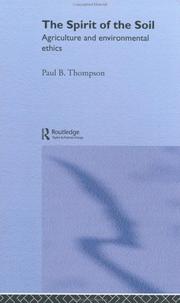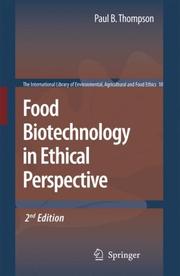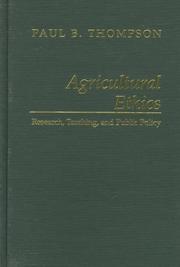| Listing 1 - 10 of 31 | << page >> |
Sort by
|

ISBN: 041508623X Year: 1995 Volume: *2 Publisher: London New York Routledge
Abstract | Keywords | Export | Availability | Bookmark
 Loading...
Loading...Choose an application
- Reference Manager
- EndNote
- RefWorks (Direct export to RefWorks)
Social ethics --- Environmental protection. Environmental technology --- Pedology --- Environmental ethics --- Environnement [Ethique de l' ] --- Ethiek van het milieu --- Ethique de l'environnement --- Human ecology--Moral and ethical aspects --- Milieu-ethiek --- Utilisation des terres --- land use --- Politique de l'environnement --- Environmental policies --- Protection de l'environnement --- environmental protection --- Agriculture biologique --- Organic agriculture --- Agriculture faible niveau intrants --- Low input agriculture --- Ethics --- #A9503A --- Agriculture --- Environmental ethics. --- Environmental aspects. --- Moral and ethical aspects. --- Environmental aspects --- Moral and ethical aspects --- Agriculture - Moral and ethical aspects. --- Environmental quality --- Human ecology --- Farming --- Husbandry --- Industrial arts --- Life sciences --- Food supply --- Land use, Rural --- Environmental protection

ISBN: 1280902000 9786610902002 1402057911 1402057903 9048174465 Year: 2007 Publisher: London ; New York : Blackie Academic & Professional,
Abstract | Keywords | Export | Availability | Bookmark
 Loading...
Loading...Choose an application
- Reference Manager
- EndNote
- RefWorks (Direct export to RefWorks)
Agrifood biotechnology—the genetic transformation of plants and animals through recombinant means—has created controversy in the food system for more than twenty years. This thoroughly revised and amended edition of Paul B. Thompson’s path breaking study of ethical and philosophical issues raised by this technology up to date. The original 1997 edition was the first book length treatment by a philosopher to focus on food and agricultural biotechnology, covering ethical issues associated with risk assessment, labelling, animal transformation, patents, and the impact of biotechnology on traditional farming communities in both the developed and developing world. The new edition reflects lessons from the hotly contested debates over those issues in the intervening decade, and includes wholly new discussions on ethical issues associated with livestock cloning, the Precautionary Principle, and the transatlantic debate between United States and European perspectives on biotechnology. Thompson’s unique and insightful approach to addressing the risks and questions of public acceptability associated with novel technology stands as a model for anyone interested in technological innovation and social change. The book should be of interest to scholars and citizens interested in the Internet or nanotechnology, while it remains an essential resource for understanding the twists and turns of debate over the role of molecular genetics in the transformation of the global food system.
Food --- Biotechnology --- Moral and ethical aspects. --- Food science. --- Philosophy. --- Agriculture. --- Pragmatism. --- Food Science. --- Philosophy of Technology. --- Idealism --- Knowledge, Theory of --- Philosophy --- Philosophy, Modern --- Positivism --- Realism --- Utilitarianism --- Experience --- Reality --- Truth --- Farming --- Husbandry --- Industrial arts --- Life sciences --- Food supply --- Land use, Rural --- Mental philosophy --- Humanities --- Science --- Food—Biotechnology.

ISBN: 0521414687 0511570767 9780521414685 9780511570766 Year: 1992 Volume: vol *12 Publisher: Cambridge: Cambridge university press,
Abstract | Keywords | Export | Availability | Bookmark
 Loading...
Loading...Choose an application
- Reference Manager
- EndNote
- RefWorks (Direct export to RefWorks)
The traditional military-territorial model of the nation state defines international duties in terms of protecting citizens' property from foreign threats. In this 1992 book about the principles of the US agricultural policy and foreign aid, Professor Thompson replaces this model with the notion of the trading state that sees its role in terms of the establishment of international institutions that stabilize and facilitate cultural and intellectual, as well as commercial, exchanges between nations. The argument focuses on protectionist challenges to foreign aid and development assistance programs, and engages with the views of a variety of economists, commodity organizations, and philosophers on world hunger and development. What emerges is a new interpretation of social contract theory that can determine goals for international trade and development policy.
Agricultural assistance, American --- Food relief --- Government policy --- Moral and ethical aspects --- Produce trade --- Moral and ethical aspects. --- 339.96 <73> --- 63 <8> --- Ontwikkelingshulp. Ontwikkelingssamenwerking. Ontwikkelingsproblematiek--Verenigde Staten van Amerika. VSA. USA --- Agriculture and related sciences and techniques. Forestry. Farming. Wildlife exploitation--Zuid-Amerika --- 63 <8> Agriculture and related sciences and techniques. Forestry. Farming. Wildlife exploitation--Zuid-Amerika --- 339.96 <73> Ontwikkelingshulp. Ontwikkelingssamenwerking. Ontwikkelingsproblematiek--Verenigde Staten van Amerika. VSA. USA --- Agricultural marketing --- Agricultural products --- Food trade --- Agriculture --- Food industry and trade --- Commodity exchanges --- Farm produce --- Famine relief --- Food aid programs --- Food assistance programs --- Disaster relief --- Humanitarian assistance --- Public welfare --- Emergency food supply --- American agricultural assistance --- Government policy&delete& --- Economic aspects --- United States --- Agricultural assistance [American ] --- Produce trade - Government policy - United States - Moral and ethical aspects. --- Food relief - Government policy - United States - Moral and ethical aspects. --- Agricultural assistance, Anerican - Government policy - Moral and ethical aspects. --- Food distribution programs --- Arts and Humanities --- Philosophy --- Produce trade - Government policy - Moral and ethical aspects - United States. --- Food relief - Government policy - Moral and ethical aspects - United States. --- Agricultural assistance, American - Government policy - Moral and ethical aspects.
Book
ISBN: 9780199391691 Year: 2015 Publisher: New York Oxford University Press
Abstract | Keywords | Export | Availability | Bookmark
 Loading...
Loading...Choose an application
- Reference Manager
- EndNote
- RefWorks (Direct export to RefWorks)
Book
ISBN: 1402087225 1402087217 9048179688 Year: 2008 Publisher: Dordrecht ; London : Springer,
Abstract | Keywords | Export | Availability | Bookmark
 Loading...
Loading...Choose an application
- Reference Manager
- EndNote
- RefWorks (Direct export to RefWorks)
This volume was written in response to the Food and Agriculture Organization (FAO) Series of Ethics Papers that broached a series of previously neglected issues in international agricultural development. The volume contains a diverse collection of highly respected international scholars offering comments and elaboration on the FAO papers on the ethics of agricultural intensification and on intensification in animal agriculture. The full text of the FAO intensification paper is followed by chapters that mount specific reactions to its relevance for agricultural technology, environmental protection, globalization and animal welfare, and these four topics are further discussed, debated and elaborated by eight commentary chapters. Questions of agricultural development policy are addressed in terms of the relevance to farmers, consumers and other interested parties, as well as from key disciplinary and philosophical approaches. The rationale and purpose behind the FAO papers is explained and suggestions are offered on how to make ethics more central to programming and planning for agricultural development projects.
Agricultural intensification --- Farmers --- Food supply --- Sustainable agriculture. --- Moral and ethical aspects. --- Professional ethics. --- Low-input agriculture --- Low-input sustainable agriculture --- Lower input agriculture --- Resource-efficient agriculture --- Sustainable farming --- Agriculture --- Alternative agriculture --- Food control --- Produce trade --- Food security --- Single cell proteins --- Farm operators --- Operators, Farm --- Planters (Persons) --- Agriculturists --- Rural population --- Intensification of agriculture --- Ethics. --- Agriculture. --- Philosophy. --- Development economics. --- Philosophy of Technology. --- Development Economics. --- Farming --- Husbandry --- Industrial arts --- Life sciences --- Land use, Rural --- Economics --- Economic development --- Deontology --- Ethics, Primitive --- Ethology --- Moral philosophy --- Morality --- Morals --- Philosophy, Moral --- Science, Moral --- Philosophy --- Values --- Mental philosophy --- Humanities
Book
ISBN: 3030612147 3030612139 Year: 2020 Publisher: Cham, Switzerland : Springer,
Abstract | Keywords | Export | Availability | Bookmark
 Loading...
Loading...Choose an application
- Reference Manager
- EndNote
- RefWorks (Direct export to RefWorks)
This 3rd edition of Food and Agricultural Biotechnology in Ethical Perspective updates Thompson’s analysis to reflect the next generation of biotechnology, including synthetic biology, gene editing and gene drives. The first two editions of this book, published as Food Biotechnology in Ethical Perspective in 1997 and 2007, were the first comprehensive philosophical studies of genetic engineering applied to food systems. The book is structured with chapter length treatments of risk in four categories: food safety, to animals, to the environment and socio-economic risks. These chapters are preceded by two chapters providing orientation to the uses of gene technology in food and agriculture, and to the goals, methods and background assumptions of technological ethics. There is also a chapter covering all four types of risk as applied to the first US technology, recombinant bovine somatotropin. The last four chapters take up 1) intellectual property debates, 2) religious, metaphysical and “intrinsic” objections to biotechnology, 3) issues in risk and trust and 4) a review of ethical issues in synthetic biology, gene editing and gene drives, the three key technologies that have emerged since the book was last revised.
Ethics. --- Agriculture. --- Agricultural Ethics. --- Farming --- Husbandry --- Industrial arts --- Life sciences --- Food supply --- Land use, Rural --- Deontology --- Ethics, Primitive --- Ethology --- Moral philosophy --- Morality --- Morals --- Philosophy, Moral --- Science, Moral --- Philosophy --- Values --- Food --- Biotechnology --- Moral and ethical aspects.
Book
ISBN: 9781402087226 9781402087219 Year: 2009 Publisher: Dordrecht ; London : Springer,
Abstract | Keywords | Export | Availability | Bookmark
 Loading...
Loading...Choose an application
- Reference Manager
- EndNote
- RefWorks (Direct export to RefWorks)
This volume was written in response to the Food and Agriculture Organization (FAO) Series of Ethics Papers that broached a series of previously neglected issues in international agricultural development. The volume contains a diverse collection of highly respected international scholars offering comments and elaboration on the FAO papers on the ethics of agricultural intensification and on intensification in animal agriculture. The full text of the FAO intensification paper is followed by chapters that mount specific reactions to its relevance for agricultural technology, environmental protection, globalization and animal welfare, and these four topics are further discussed, debated and elaborated by eight commentary chapters. Questions of agricultural development policy are addressed in terms of the relevance to farmers, consumers and other interested parties, as well as from key disciplinary and philosophical approaches. The rationale and purpose behind the FAO papers is explained and suggestions are offered on how to make ethics more central to programming and planning for agricultural development projects.
General ethics --- Economic conditions. Economic development --- Developing countries: economic development problems --- Engineering sciences. Technology --- Agriculture. Animal husbandry. Hunting. Fishery --- ethiek --- filosofie --- landbouw --- ontwikkelingssamenwerking --- ingenieurswetenschappen --- Agricultural development --- Food production --- Intensification --- Food supply --- Ethics --- living standards --- socioeconomic organization --- Economic sociology --- value systems --- Agricultural intensification --- Farmers --- Sustainable agriculture --- Moral and ethical aspects. --- Professional ethics. --- world --- landbouwbeleid (lt) --- 630.2 --- veehouderij(lt) --- ethiek (lt) --- ethisch ondernemen (lt)

ISBN: 0813828066 Year: 1998 Publisher: Ames : Iowa State University Press,
Abstract | Keywords | Export | Availability | Bookmark
 Loading...
Loading...Choose an application
- Reference Manager
- EndNote
- RefWorks (Direct export to RefWorks)

ISBN: 9781402057915 9781402057908 Year: 2007 Publisher: Dordrecht Springer
Abstract | Keywords | Export | Availability | Bookmark
 Loading...
Loading...Choose an application
- Reference Manager
- EndNote
- RefWorks (Direct export to RefWorks)
Philosophy --- Engineering sciences. Technology --- Agriculture. Animal husbandry. Hunting. Fishery --- Biotechnology --- Food science and technology --- filosofie --- landbouw --- biotechnologie --- pragmatisme --- ingenieurswetenschappen
Digital
ISBN: 9781402087226 9781402087219 Year: 2008 Publisher: Place of publication unknown Springer
Abstract | Keywords | Export | Availability | Bookmark
 Loading...
Loading...Choose an application
- Reference Manager
- EndNote
- RefWorks (Direct export to RefWorks)
General ethics --- Economic conditions. Economic development --- Developing countries: economic development problems --- Engineering sciences. Technology --- Agriculture. Animal husbandry. Hunting. Fishery --- ethiek --- filosofie --- landbouw --- ontwikkelingssamenwerking --- ingenieurswetenschappen
| Listing 1 - 10 of 31 | << page >> |
Sort by
|

 Search
Search Feedback
Feedback About UniCat
About UniCat  Help
Help News
News